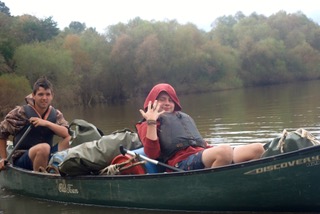 Building Trust and Overcoming Anger: Charles’ Inspirational Journey
Building Trust and Overcoming Anger: Charles’ Inspirational Journey Before Attending Fair Play Camp School
Charles’ life was in turmoil. He had a difficult relationship with his mother, marked by constant arguments and misunderstandings. His grandmother was his safe haven, but even she couldn’t bridge the gap between Charles and his mother. This strained family dynamic left Charles feeling isolated and rebellious.
Charles admits that he was not in a good place before camp. “I would lie and talk back,” he recalls. “I brushed off my mother’s feelings, and it just wasn’t a good place for me or her.” His school life was a mixed bag. While he was a good student academically, his attitude sometimes got him into trouble.
The Decision to Attend Camp
The decision to attend Fair Play Camp School was not an easy one. A mutual friend recommended the camp to Charles’ mother and grandmother, and they decided to check it out. Despite initially thinking it seemed like a cool place, Charles was vehemently opposed to going. “I had a fight with everybody,” he remembers. “I was in that office for three hours saying no, walking out, and yelling.”
It took a lot of convincing, but Charles eventually realized that his life wasn’t working the way it was. He needed a change. His mother and grandmother saw this too, and they hoped camp could provide the help he needed.
The First Day at Camp
The first day at camp was tough. Charles describes it as one of the saddest days of his life. “All I remember from the first day is crying,” he says. “I just cried and cried.” Leaving his mother in the parking lot and meeting the other campers was overwhelming.
Challenges and Growth
Charles’ time at camp was marked by significant challenges. For the first six months, he was extremely stubborn. “I wouldn’t do my chores, wouldn’t work, wouldn’t eat with the group, and wouldn’t talk to the group,” he admits. His chief would have likely described him as the most stubborn camper.
However, a breakthrough moment came during a group discussion. Charles realized that his behavior was making life harder for himself and others. He began to see the need for change.
Trust was a significant issue for Charles. He only trusted his grandmother and had difficulty trusting anyone else. The camp environment, however, began to change that. When a dear friend of his passed away, the support and understanding from his group and chief helped him open up and start trusting others.
Learning to Trust and Overcoming Anger
Building trust was a slow process, but it was pivotal. “My chiefs pushed me to be the person they knew I could be,” Charles reflects. Along with trust, he had to work on his anger issues. “I had a nickname in my group, ‘Chili,’ like the red chili pepper because of my temper,” he says. His first few months were filled with incidents where he was ready to fight anyone who crossed him, leading to multiple restraints.
Turning the Corner
About six months into his stay, things began to improve. Charles started enjoying his chores and even made it a game to see how quickly he could complete them. “After six months, I loved doing my morning chores,” he says. His attitude shifted, and he became more positive and cooperative.
Charles felt ready to graduate about a year and three months into his camp stay. He had learned to live successfully and felt prepared for the outside world. Transitioning back into normal life was a challenge, especially with the impact of COVID-19. “Reentering the world was difficult because you had been secluded for so long,” he explains.
Life After Camp
Since graduating from camp, Charles has continued to grow. He graduated high school and was accepted into the nursing program at Greenville Tech. During the summer, he worked with his grandmother’s estate sale business, which helped keep him busy and productive.
Charles expresses deep gratitude to the donors who make camp possible. “You helped make my life a better place to be,” he says.
Thanks to you, Charles’ journey at Fair Play Camp School is a testament to the transformative power of trust, support, and perseverance. From a troubled home life to finding his path and preparing for a future in nursing, Charles’ story is one of hope and change.
 Fair Play Transformed Our Family
Fair Play Transformed Our Family We were afraid he would end up in juvenile detention!
“Things had gotten so bad with Elijah that we didn’t know what to do with him,” Wendy, his mother, remembered. “We even considered a failed adoption and sending him back. That’s how bad it was. But, we prayed about it and felt the Lord saying to us, ‘No, he’s your son.’”
He made life miserable for everyone around him
“Elijah came to us when he was 18 months old,” Wendy said. “He was in the foster care
system and being moved from home to home. That caused him a lot of struggles and behavior
problems.
After we adopted him, his behavioral issues increased every year and became more violent.
He would constantly lie, wouldn’t take responsibility for his actions, and continually
manipulated us and his siblings.”
“He was very aggressive against me,” Wendy continued. “He would throw things at me, call
me awful names, and was very destructive.
In first grade, he would turn the classroom upside down. They would have to clear the
classroom of the other children because of how violent he was. I ended up trying to homeschool
him.”
We were alone
“We felt very isolated,” Wendy explained. “Friends and family had no idea what we were
going through. They would offer suggestions of what we should be doing. We know that they
were just trying to be helpful, but it wasn’t good.
We were looking for someone who would just listen and not offer suggestions. We had tried
everything, and nothing was working.”
Looking for help
“We tried different therapies, counseling, and supplements,” Wendy said. “We also had enrolled him in several short term programs.
But as things continued to get worse, we decided that he needed a long term intervention. His
problems had been building for years. It was going to take time to deal with behavioral issues.
I began to research possible options. Imagine my surprise when I found Fair Play and
realized it was only an hour and twenty minutes ffrm our house. It seemed like the perfect fit for
Elijah. So, I made the call.”
Hope – finally
“When Josh, the family worker, came to visit us for the first time, I was so nervous,” Wendy
said. “I was afraid that Elijah was going to freak out and act out.
But Josh was so good with him. He sat with Elijah and showed him pictures of camp. Elijah
seemed to connect with him immediately. They even set some goals for Elijah.
I was so blown away. I couldn’t believe that it was my son sitting there and calmly talking. It
was unreal. I started to have a little hope.”
What a difference a year can make
“We started to see changes after six months at camp,” Wendy said. “In the beginning some of
the home visits were pretty rocky. But as time went on, their continued to be some angst, but we
were seeing some positive things.
At the one year mark, we really began to see changes. It was like we saw an actual heart
change. He wasn’t just doing things to please us or to put on a show. He was really different.”
Back home
“We are honestly shocked by how well he is doing since returning home,” Wendy remarked.
“He is making good grades at school. He is making friends. He is relating well with his siblings.
He has had a few stumbles since returning home. But instead of shutting down and becoming
aggressive, we can talk about the problem. He is very redirectable and able to talk about things
calmly. That’s never happened before.
Before camp, I was afraid he would end up in juvenile detention. But now, the sky is the limit
for him. I’m not saying that he won’t have struggles, but this intervention was exactly what our
family needed. It changed our lives.”
I wish I could hug all of you and say thank you
“We could not have afforded camp without you, the donor, making it possible,” Wendy
exclaimed. “You are having a tremendous impact on people’s lives.
You not only changed Elijah’s life, but you have transformed our family as well. And you are
helping many other families as well.
I wish I could hug every one of you and say thank you in person. We are deeply, deeply,
grateful.”
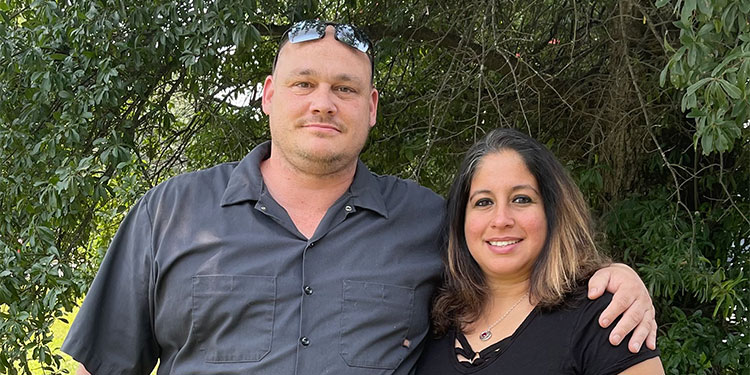 Without Camp, I Would Have Gone to Jail
Without Camp, I Would Have Gone to JailYou helped Brian change the direction of his life.
When Brian came to camp 27 years ago, it totally changed the course of his life.
Like a lot of boys, Brian was struggling at home. “I was having a rough time,” he explained. “I was acting out violently. My temper was out of control. I would do things just to get in trouble so that I could get away from home.”
“I did not think about the consequences,” he continued. “Going to camp really helped, because it taught me to look deeper into things and communicate my feelings.”
I learned life skills I still use today.
“In the beginning, I found it hard to fit in the group,” Brian said. “When there was a problem, the whole group would stop what we were doing, and work on that problem. As a selfish boy, I found that aggravating. But as time moved on, it became standard operation to help out. It became easier.”
“Today, I still use the problem solving skills I learned at camp,” he said. “It comes in really handy with my job. I can reason with people on a personal level and diffuse volatile situations.” “I also use the meal planning and budgeting skills I learned at camp,” he explains. “I’m teaching it to my children to help them save money and function in society.”
Camp helped our whole family.
“Camp helped our whole family,” Brian remembers. “My mother learned how to communicate better with me and my sister. We would do things together as a family.”
Today, Brian and his wife have six children. “My experience at camp has helped me through my life. It’s helped me to be a better husband to my wife and a better father to my children. I am passing down to them what I learned at camp.” When asked what he would say to parents who are considering camp for their son, he responded, “Give it a chance. It’s awesome. It’s not just going to help your son; it will benefit your whole family.”
Thank you for changing everything.
“I probably would have ended up in jail, had I not gone to camp,” Brian concludes. “Thank you for giving me the opportunity. You’ve helped change my life and the future of my family.”
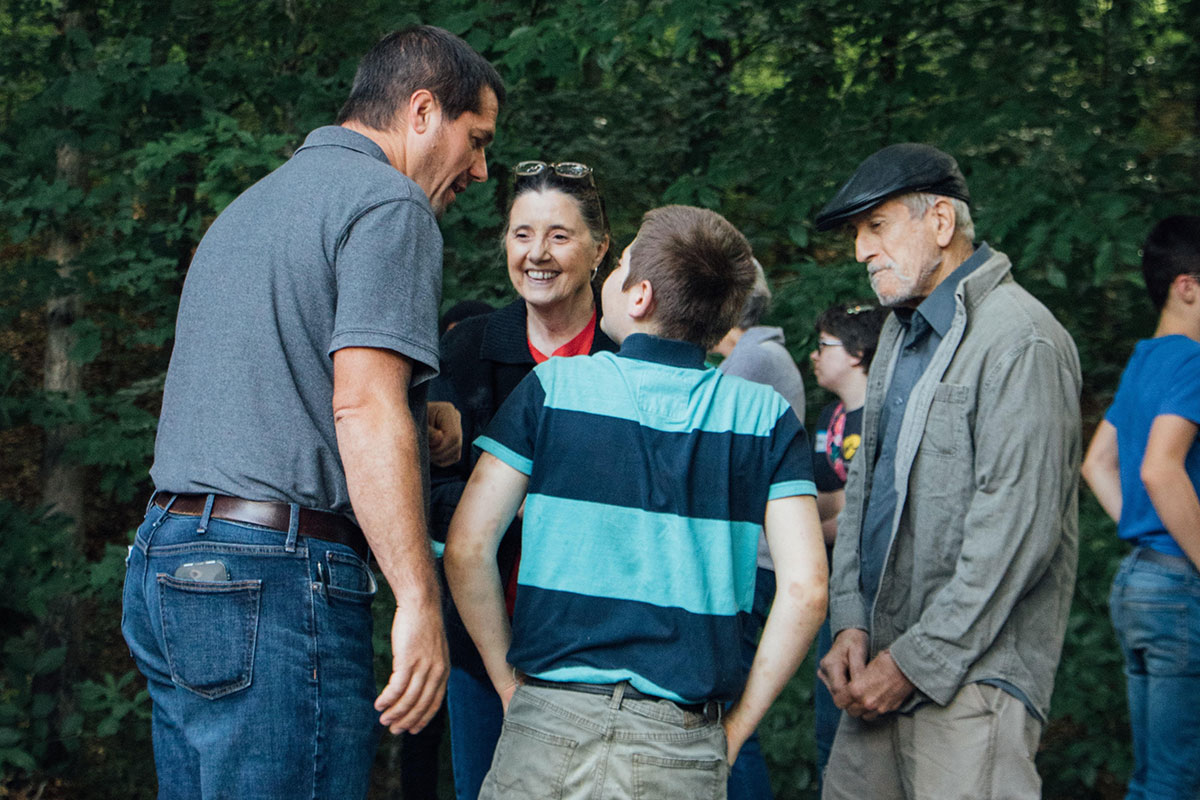 I didn’t know what to do or how to cope!
I didn’t know what to do or how to cope!But my family worker gave me hope that my son could change.
“I was very discouraged,” Nancy* recalls. “My son would get extremely angry and had total disrespect for me. It was heartbreaking to see the contention and strife between him and his brothers.”
“I didn’t know what to do or how to cope with the situation,” she continued. “I felt alone. Others didn’t understand what I was going through. We desperately needed help.”
Nancy learned about Fair Play from friends whose son had attended camp. “I had confidence that it was a good place because it is Christ-centered,” she said. “I had hope that it would be a good experience for us.” She contacted camp, and Josh, her family worker, visited their home.
The First Visit
“I quickly realized that Josh understood what we were going through,” she commented. “My son initially resisted meeting with him, but Josh persisted and they slowly began to build a relationship. He was able to connect with my son by walking the trails in our woods and sharing other outdoor interests.”
The decision was made, and the wait began. At times, I wondered if we would make it. During this time, God increased my faith by showing me that his timing is perfect.”
Her family worker kept her going
When Nancy finally dropped her son off at camp, she felt a mixture of sadness and relief. “I felt sad to drive away without him, and relief that he was finally getting the help he needed.”
“If there is a singular thing that’s made camp workable for me, it has been Josh,” she said. “He told me what to expect. He answered my questions. He’s been at our side through the whole camp journey.”
“We talk almost every week,” she continues. “He listens to my concerns. He gives me updates about my son. He’s been like a friend and advisor through the process. I feel like I can call him at any time, and I appreciate that very much!”
Working through problems
“One weekend he refused to return to camp after home visit,” she said. “He was upset about some things that had happened in his group. Josh convinced him to return. When we arrived at camp, Josh, his chiefs, and several supervisors circled up with him to talk through the issues. It was great for me to experience camp in action. My son felt validated, and that he had been heard.”
Hope for the future
“Our camp journey has been going on for more than a year now,” Nancy continues. “I am understanding my son better, and I can see changes in his attitudes and responses. The one desire that I have for my son is that he be surrendered and devoted to Jesus.”
When asked what she thought life would be like without camp, she responded, “I don’t even want to think about it!”
“I’m so thankful because there is no way that I could have afforded camp on my own,” she said. “I deeply appreciate the people who are covering the cost for my son to be at Fair Play. I can only pay a tiny portion of the cost. I am so thankful that we were able to participate in the camp journey.”
“Thanks to all of you who generously gave to make camp possible for us. We are so thankful!”
* not her real name
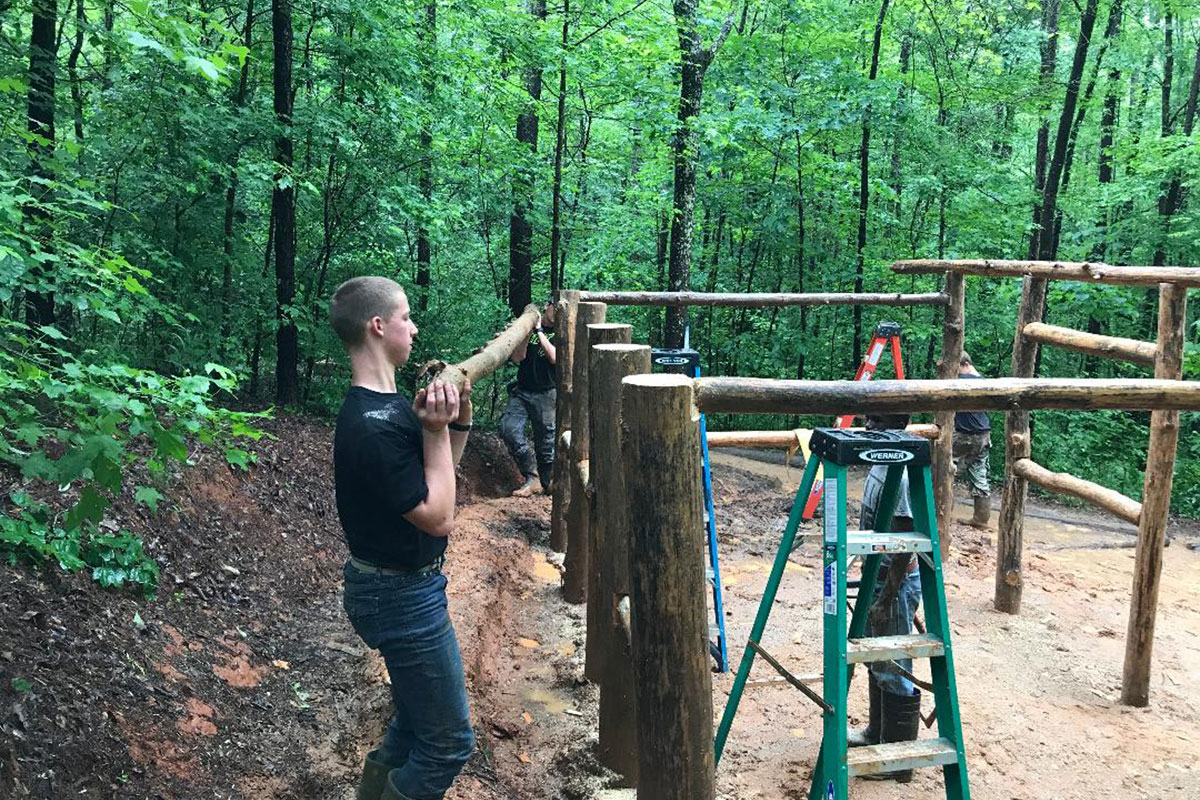 Finally, We Were Getting Help
Finally, We Were Getting HelpWhen all seemed lost, you provided hope for a family in trouble.
Samuel’s mother was a drug user and five months pregnant when she went to prison. She learned to know Marvin and Darlene through their church’s prison ministry, and wanted them to care for the baby. Samuel joined their family when he was just two days old.
As he grew older, Samuel began to struggle. “I believe that he struggled with identity issues like adopted children do,” Marvin explained. “He began to have behavior issues at school. And soon, trouble began at home as well.”
“He would become very violent,” Darlene remembers. “When I would ask him to do something he would get angry and uncontrollable. I didn’t know if I could trust him. I was afraid that he was going to hurt me.”
“He couldn’t control his anger,” Marvin said. “He was unable to manage his attitudes or control himself. He would either go into a depression funk or get violent. When he got angry, he would grab people, and we were afraid of what he might do.”
“Samuel refused to talk about what was bothering him,” Darlene said. “He wasn’t coping and dealing with his issues. No matter what we did, or who did it, he was unwilling to open up and share.”
Things continued to get worse. At one point, Marvin was afraid that he might have to get the police involved. “I always felt like I had to do things my way and didn’t listen to anyone around me,” Samuel added. “I did my own thing, at my own time, and didn’t care what other people thought.”
Marvin and Darlene decided that Fair Play Camp School would be a good place for Samuel, and he agreed to go. “I knew I needed help, and we needed to find ways to solve my problems.” Samuel said. “We were not making any progress at home. I needed to learn to do things differently.”
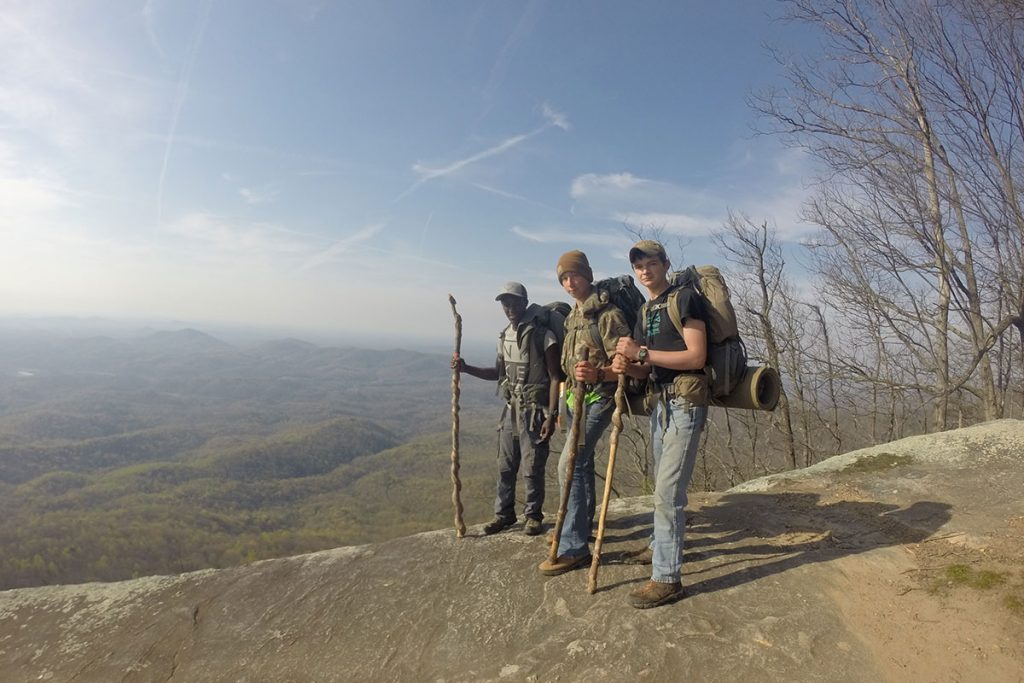
We felt relief
After dropping Samuel off, Darlene cried the whole way home. “We wondered if we had done the right thing,” Marvin remembered. “It’s a very rustic place. But, at the same time, we felt relief. Finally, we were getting some help. We now had people alongside us to help us deal with our problems. We had been struggling on our own for a long time. The staff at camp understood what we were going through.”
“We were hoping that camp would prompt Samuel to open up and talk about his problem,” Darlene said. “It took some time, but he slowly started to open up. It was not easy for him. He still struggles with it today. But, camp has given him the tools to help him work through his problems.”
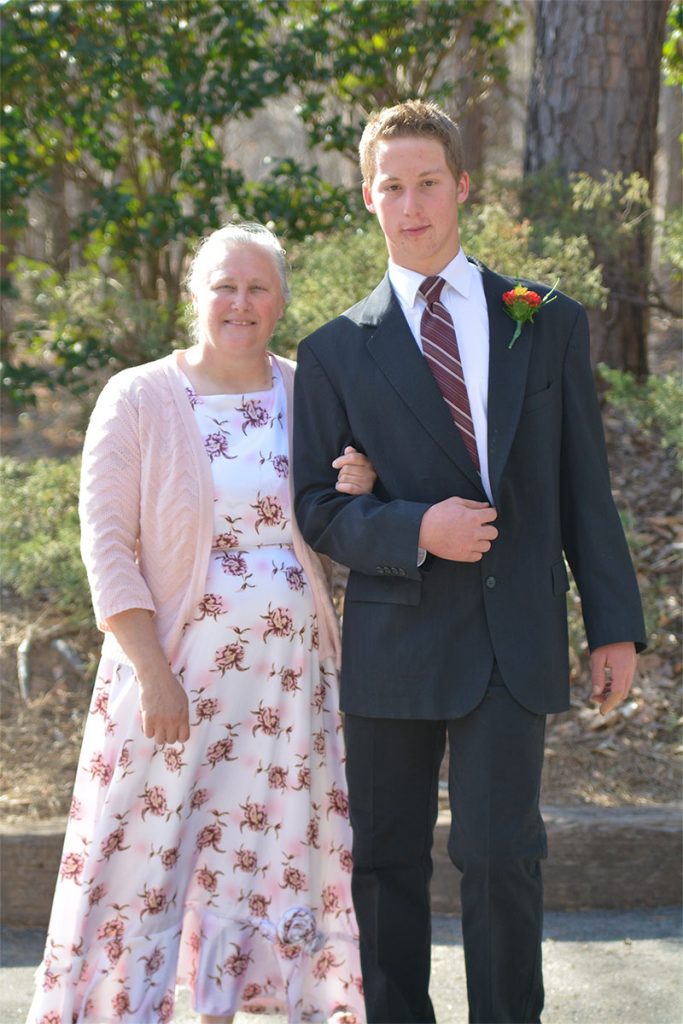
He now has the tools for success
“I think that some of the problems we faced before camp will always be there,” Marvin said. “But he has learned how to manage and control his anger. He voluntarily joined an accountability group at church. That really helps. He is opening up with them.”
“I think we’ve all learned how to cope with problems,” Marvin remarked. “When Samuel gets triggered, we don’t argue. We now sit back and ask ‘What can we do?’ We are able to talk things out. When he uses the tools he learned at camp, things go well. When he forgets to use them, he reverts back to the old ways.”
“The most difficult part of camp was talking about how I feel,” Samuel said. “For me, opening up so others can help me is not easy. Camp really helped teach me to open up. I also learned how to help others with their problems.”
“Before camp, we could never do anything right,” Darlene said. “He came back from camp very appreciative of what we have done for him.”
“If I hadn’t gone to camp, things would be even worse than they were before,” Samuel suggests. “I would be more miserable not knowing how to work through my issues. I probably would not be able to hold down a job.”
“Camp gave him the tools he needs to live a productive life,” Marvin concludes. “Together, with our family and Samuel, we are learning how to live together in peace and harmony.”
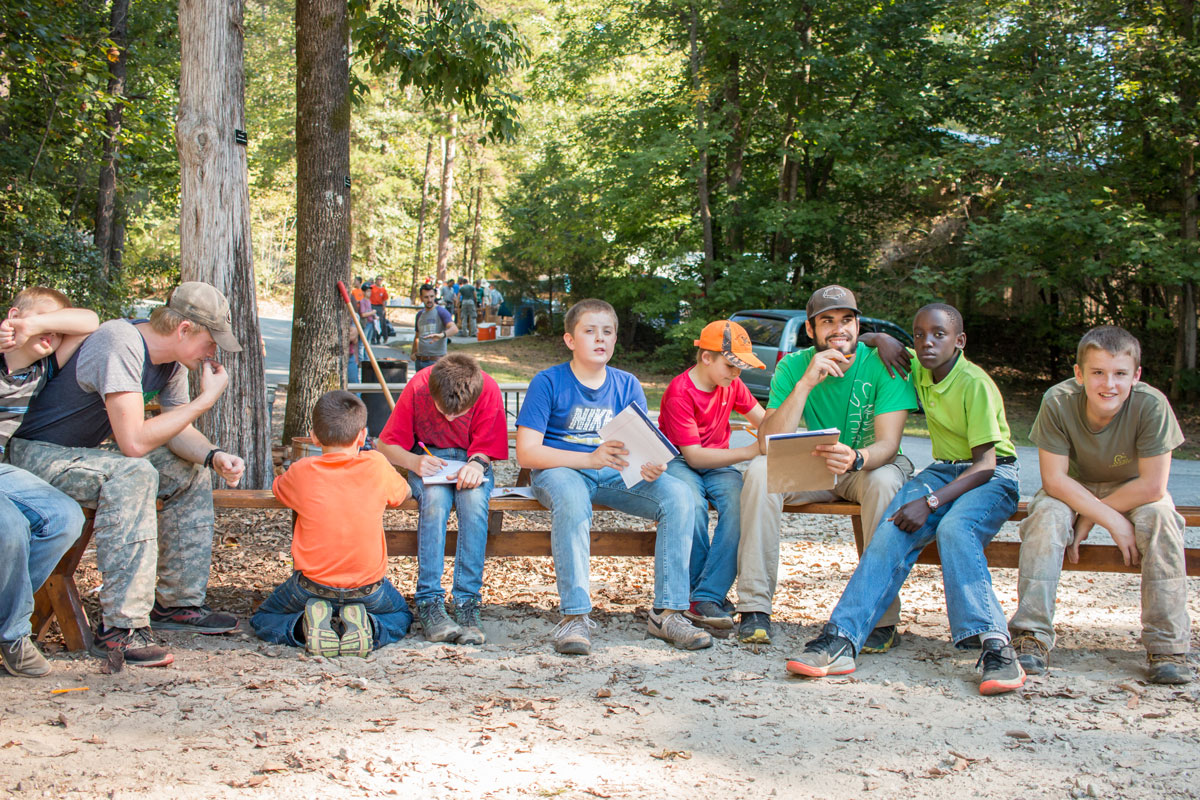 I was Afraid to Ask Him to Take Out the Trash
I was Afraid to Ask Him to Take Out the TrashBut now, because of you, the fear is gone!
“I was afraid to ask him to take out the trash,” Guy’s mother Amanda recalls. “We just didn’t want to do anything that caused an outburst. We were walking around on pins and needles, trying to keep everything calm.”
“I was very angry,” Guy said. “I wouldn’t listen to my parents. I was throwing things and punching holes in walls. I wasn’t very nice to people. I felt a lot of hatred.”
“We started noticing that something was wrong when Guy was four years old,” his father Glenn said. “As he got older it got worse. We took him to various doctors and counselors and nothing seemed to work. One counselor recommended we check out residential programs. A relative suggested Fair Play and we gave them a call.”
“When Paul, our family worker, first visited us I finally felt like that someone understood what we were dealing with,” Amanda said. “This was not the first boy like Guy that he had seen. We started to have hope that we could get help. It was such a huge relief.”
“Guy was really good at putting on a good front at school and church,” Glen explained. “But Paul saw right through him and understood what we were struggling with.”
Guy agreed that he needed help and made the choice to go to camp.
Taking out the Trash
“It was about the third home visit that I mustered up the courage to ask Guy to take out the trash,” Amanda said. “And, he just did it. When we asked him to do things around the house, instead of having a problem or acting out, he would do them. That’s when I noticed that he was starting to change.”
Setting Goals and Solving Problems
“Camp doesn’t just help the boy, they help the whole family,” Glen explains. “They taught our family how to function as a unit. I knew I was going to have to make some changes when Guy returned home. We were both excited and nervous.”
“When he first came home there was a honeymoon period,” Amanda said. “Then we saw a little backsliding. But since then it’s been a consistent progress of seeing him make changes and mature. We’ve seen a lot of growth since he’s returned home.”
“As a family, we are establishing goals and keeping each other accountable,” Glen said. “We are learning to spend quality time together as a family.”
“Before camp, when Guy had a problem, we would send him to his room,” Amanda remembers. “Now, when he gets angry or has a problem, we will shoot hoops or play ping pong. The whole family helps him work on his attitude. Even his younger sister, Julia, gets involved. I take on more responsibility in helping him work through his problem and we do it together as a family.”
“Recently I was looking over Guy’s goals while he was at camp,” she continued. “In his first session, his goal was to stop throwing things. The goal for his last session was to be a leader and how to take a hard call-out. You can see the big improvements he made over the seventeen months he was there. I don’t know where we would be if Guy did not have the opportunity to go to camp.”
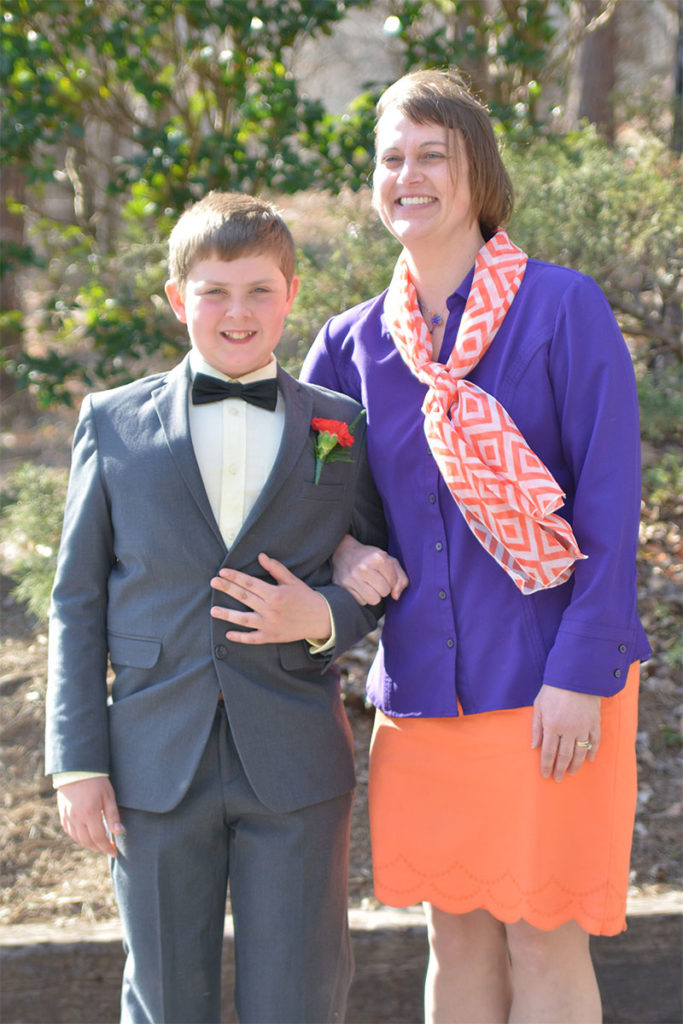
Thanks to you, Guy and his family are experiencing wholeness!
“I would like to thank the people who financially support camp,” Amanda said. They are not just help boys, they are helping to heal families and their communities. By helping the boy, they are helping the whole family.”
“Camp is one of the best missions that I’ve ever encountered or experienced,’ Glen added. “They put biblical principles into everyday practice and prove that it works. It’s just amazing.”
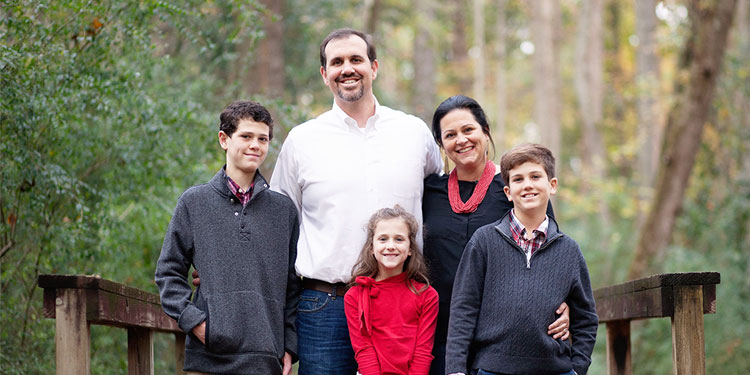 We Couldn’t Have Friends Over or Go on Vacation
We Couldn’t Have Friends Over or Go on VacationBut now, thanks to you, he’s a joy to be around!
“Tripp was always a difficult child,” his father Bonner explains. “And as he got older, he became more challenging. It started as bad behavior at home, but then started spilling over to school. Almost every day became a battle.”
“He was outright defiant,” his mother Kristen added. “He would yell and scream at us and throw things. Anytime he was told ‘no’, there was going to be a blow-up.”
“He was taking control of the house,” she continued. “We couldn’t go on vacations or have friends over. We never knew what was going to be happening at our house. Our social life was very limited. We couldn’t plan anything because at any moment, he could have a meltdown.”
“When we started getting weekly calls from school about how he was disrupting classes and disrespecting teachers, we knew it was time to do something,” Bonner said. “A friend of the family had sent her grandson to camp, and he was doing very well. She encouraged us to give Fair Play a call.”
A Gift from Camp
“When he came home for his first home visit, he was very quiet and subdued at first.” Bonner said. “It wasn’t until Saturday evening that we had our first flare up.”
“We got a glimpse of what he could be,” Kristen remembers. “That was a huge gift that Camp gave us, even if it was just for a day. The next visit he behaved for two days, and it kept stretching out longer during each visit. It finally got to the point where he could go the whole four days without acting out. There would be an argument here or there, but we continued to see improvement.”
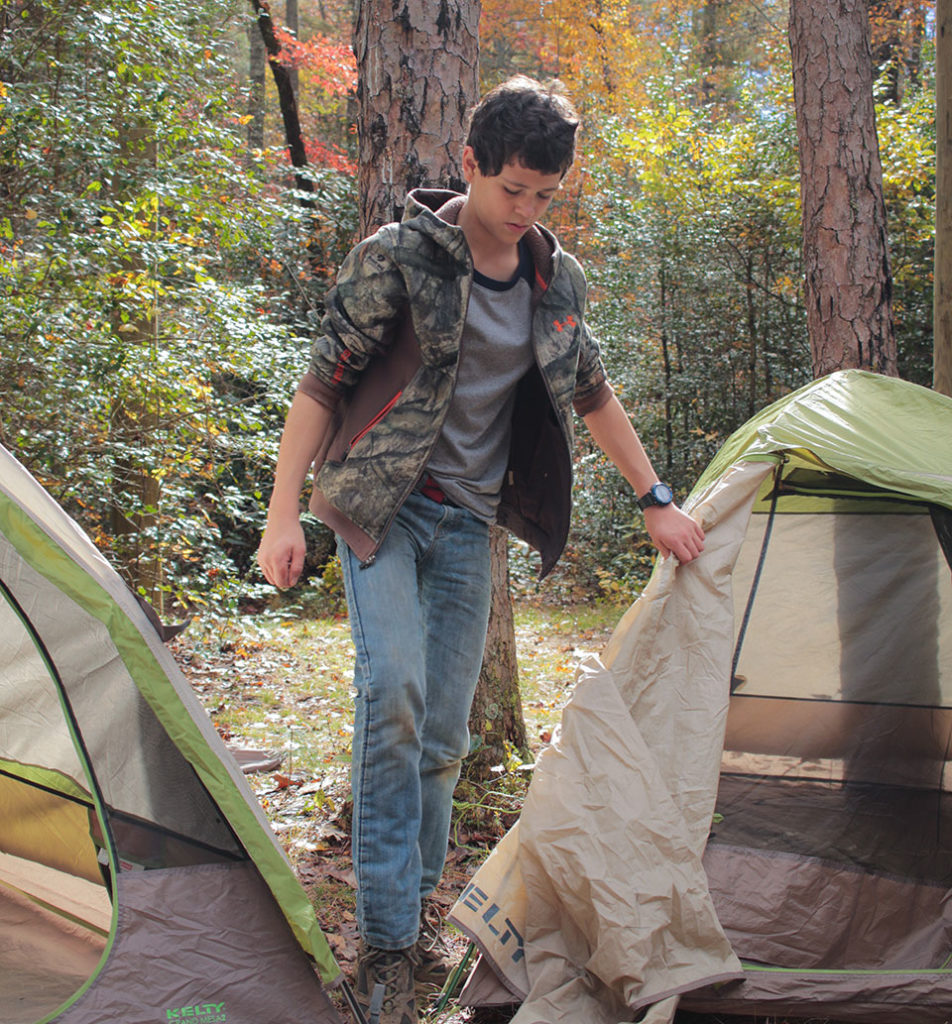
Today, Teachers Enjoy Having Tripp
“We’re not getting calls from school about Tripp’s behavior anymore,” Kristen said. “Whenever we see his teachers, they say how much they enjoy having Tripp in their classes. And now that he has a good reputation at school, he wants to keep it that way. He was never concerned about that before.”
“Camp instilled structure in Tripp,” Bonner explains. “Without structure, he struggles. With school back in session, he is involved in JV football, which is big for him. He has study hall between practice and classes. He is staying busy and organized. In the evening, he gets everything he is going to need laid out for the next day.”
“His room is spotless, probably cleaner than ours,” Kristen added. “On the weekend, he washes his own clothes and sets everything out for the following week. Camp really helped him to be organized and prepared.”
I Don’t Know Where We Would Be Without Camp
We still have things to work through,” Bonner said. “But I don’t know where we would be without camp! It was not livable before he went. Camp gave us hope that if we stuck with Tripp and stayed committed to the process, he would become that kid that we knew he was capable of being.”
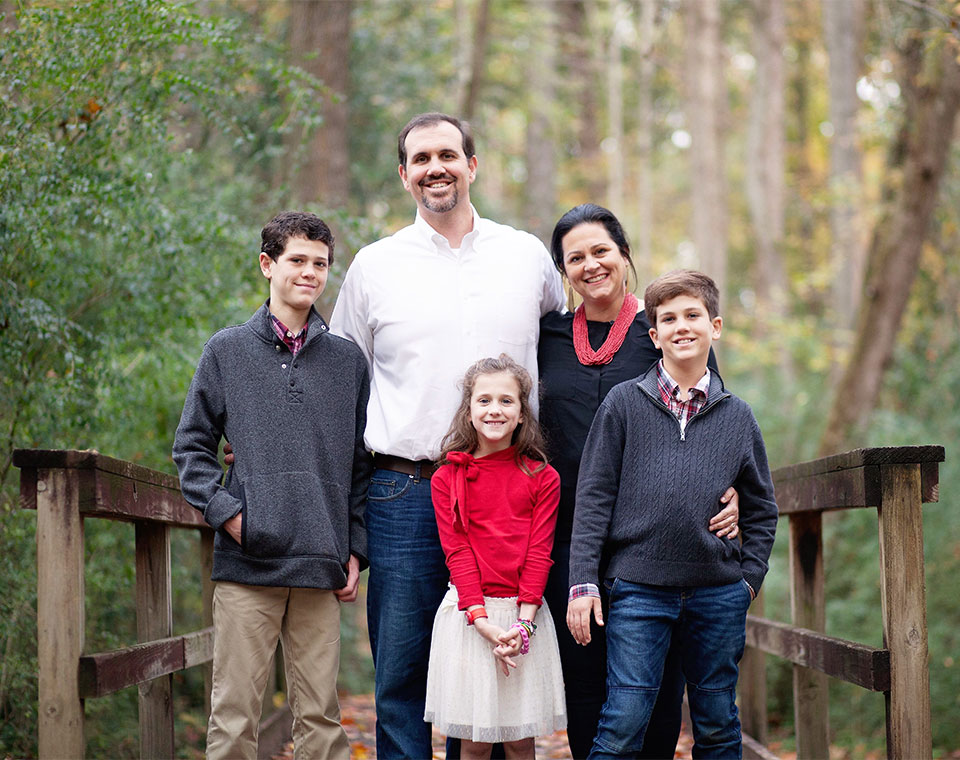
“Thank you for making it possible for Tripp to go to Fair Play,” Kristen said. “It’s powerful for a boy to realize that he is loved by more than just his family – but also by chiefs, staff, and supporters like you.”
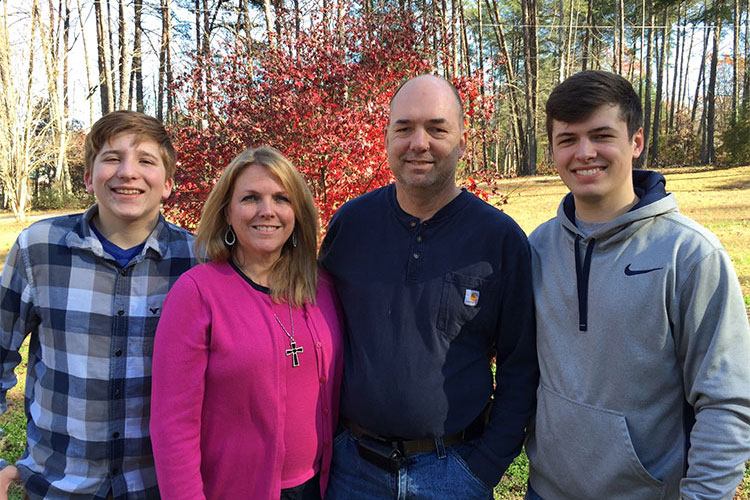 Serving Adoptive Families at Camp
Serving Adoptive Families at Camp“We Thought Love Would Be Enough!”
These families who adopted from foreign countries were often unprepared for the effects of their son’s previous experiences. Many boys came from orphanages where they experienced neglect. This can cause negative behaviors later in life. Other boys experienced abandonment and loss from their biological families. They frequently struggle to build relationships and trust with their adoptive families. The result is sometimes disarray and turmoil in the family.
“We did so much for our son; why doesn’t he appreciate it?” is a question that many of these parents ask themselves.
For years they did everything possible for their son. But their options were running out. They had no place to turn. They didn’t know what to do next. They were desperate.
Evan
Evan had experienced a lot of severe neglect in a Ukrainian orphanage. “He was severely underweight when we got him,” his mother Christine remembers. “I thought that we would just love on him, and that would be all he needed.”
“Because he has no memory of that trauma and wasn’t verbal, he was not able to process it,” she goes on. “He was not able to talk about it in therapy. He can’t recall it, but it’s there.”
Things really got bad with Evan when puberty hit. He was bullying other kids and getting behind academically.
Once, after a violent incident, Christine told him that they knew he didn’t want to be this way. They were going to pray for an answer. He responded, “There’s nothing to pray about. God can’t fix me.” He had given up on himself.
Bradley
Many children adopted from foreign countries suffer from reactive attachment disorder (RAD). Bradley was one of them. “RAD is a condition in which a child doesn’t establish healthy attachments with parents or caregiver,” explained his mother Sharon. “It may develop if the child’s basic needs for comfort, affection and nurturing aren’t met.”
Children with RAD thrive on chaos and upheaval. “Our family life was out of control,” she recalls. “We couldn’t take him out in public. The more we showed him affection, the more he would push us away. He was tearing our family apart!”
“Unless you live with a child with RAD, you have no idea what it’s like,” his father Scott relates. “Our closest friends and family members would comment on our supposed lack of parenting skills. We felt very alone!”
Hudson
“In the orphanages, there aren’t enough caretakers for all the children,” Hudson’s mother Tamela explains. “So they don’t get a lot of one-on-one attention. They don’t get held and rocked. They do the best they can with the allocated resources.”
Like many children from these orphanages, Hudson had developmental delays in many areas. He responded well to much of the therapy, but there were still behavior issues. He was finally diagnosed with RAD. “That rocked our world,” Tamela remembers. “We knew that it was going to be a sustained effort for the rest of our lives.”
“As time passed, it continued to get worse,” she continues. “When he tried to hurt another child at basketball camp, we knew that we had to do something.”
Josh
Josh was not in an orphanage, but he suffered early loss when his mother and twin brother died soon after he was born. In that culture, having twins was a curse. Since Josh was alone, he would have been treated as an outcast. He was rescued by missionaries and eventually adopted by Rodney and Gina.
When Josh turned seven, the hurts and feelings started to surface. He would keep all his feelings inside and refuse to talk about them. Then something would happen and he would erupt in fits of rage. They were at loss with how to deal with his issues.
He would take out his anger on Gina—hitting and throwing things at her. But they could not get him to talk about what was bothering him. Then he started hitting and disrespecting other people.
No Place to Turn
Their situations felt hopeless. These families tried many therapies and various methods to get help. Nothing seemed to work. They didn’t know what else to do. “Our son had every test known to man done on him,” one father said. “We were told that there was nothing they could do for him.”
“One of the things about RAD is that the number of people you can rely on to help gets smaller and smaller and smaller and smaller,” another father said.
“Since he was adopted from another country, we had no help from the Department of Social Services,” a father explains. “We were on our own. We didn’t know where to turn.”
In their desperation, these families searched far and wide for a solution. They often learned about camp from other families, or a professional recommended it. Many families were surprised that camp felt they could help their son. “Our family worker said they could help us with our son,” one mother said, “but… I didn’t believe him.”
Change Begins
“Camp provided the time and attention for our son that we couldn’t,” a father observes. “They could take the time to stop everything and deal with his issues. If he acted out, the whole group would circle up and deal with the problem at hand. You just can’t do that in a family environment. That’s the sort of thing that has brought change.”
“Camp provides a space for a boy to deal with his attachment difficulties,” explains Gary Barnhart, program director. “We have the time at camp for him to share when he is struggling. His chiefs and group will stop everything to focus on the present distress. As he begins to open up, the others speak into his life in a caring and understanding way. Over time, his brain will start to reframe relationships as he learns to express what he is feeling and begins to trust others.”
“Everything we do at camp, we do together,” Daniel Hochstetler, executive director, said. “The constant interaction with his chief and the other campers fosters trust. As they solve problems, they are able to get below the surface of his acting out to see what is really bothering him. As they care and help each other, the boy becomes part of the solution – not just a problem. He begins to believe that he can be different.”
Families often notice change within a few months at camp. For many boys, it’s learning to react to problems in a more productive manner. “On one home visit, Josh was having a bad attitude,” his father explained. “When asked what was going on, instead of getting angry like before, he admitted it and explained why and changed his attitude.”
“His first home visit was amazing,” another mother remarked. “He was different, especially with me. To have him look at me and say ‘yes ma’am’ – that was priceless. Six weeks at camp accomplished more than all the other things we have done throughout the years.”
“You always know that camp has your back,” comments Scott. “You always know that they are only looking out for the best for your child. You can be open and honest with the staff because you know they understand your situation. They made us feel safe.”
Life Goes On
“The past few years have been a whole lot easier,” Warren explains. “It’s not been a cake walk, but we now have the tools to work through our problems. I don’t where he would be without camp. He was headed for some type of incarceration.”
“Camp helped his decision making,” Christine said. “He now has the wherewithal to make a good decision. Now it is up to him. When he makes a bad decision, he can process what he has done, where it can lead, and what he can do about it.”
Josh has been home a few months. He still has things to work through and it has not always been easy. “He still gets angry, but it’s what he does with it that has changed,” Rodney said. “When issues surface, he’s quick to say ‘That’s not right, lets change this.'”
“Camp takes something from unmanageable chaos to manageable chaos.” A father explains. “It’s still hard, but he doesn’t end up with the same outbursts. We thought we could bring these boys into our home and change them with a lot of love. But the hurts and scars were so deep that we realized that we needed help.”
“When a boy graduates and goes home, the family is given a renewed hope that things can be better,” Daniel said. “With all that they have been through, many families quit believing that they can be a healthy family. The camp experience renews their passion. It gives them the energy, courage and hope to move on. Camp doesn’t fix the boy. We help them understand what the problems are which gives them the confidence and tools to work through them.”
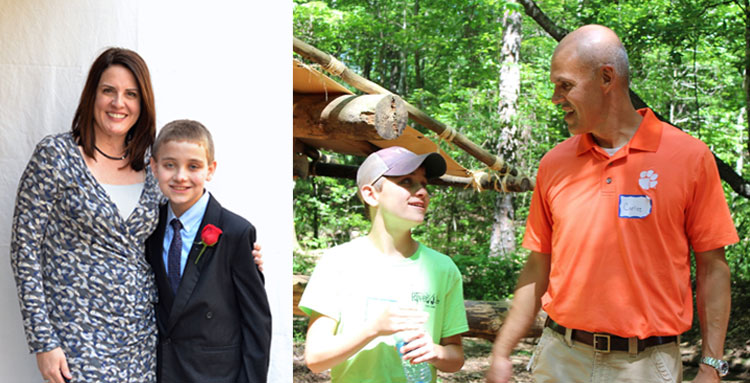 Going Home; The Journey Continues
Going Home; The Journey ContinuesBefore a boy comes to camp, family workers conduct multiple visits with his family to help prepare them for the journey at camp. During camp, they stay closely involved with the family, keeping them informed of his progress and helping them prepare for their son’s return home after graduation.
For most families, the real work starts when their son graduates and returns home. They have seen great progress while he was at camp, and he returns home with the tools he needs to lead a successful life. But a boy’s return to home, school, and normal life can create some difficult challenges. How do they maintain and then build on the growth that he experienced at camp? How is camp personnel involved in that part of the journey?
Recently I had the opportunity to sit down with Carlos and Tamela, parents of a former camper, along with their family worker, Phil, to discuss their journey since their son returned home a few months ago.
Tamela: Camp Did a Good Job of Giving Him Tools
“When Hudson came home, our expectation was that things should be better than before he went to Fair Play, but that he would need reminders and constant structure for the rest of his life. It would be up to us to continue the structure of camp in our home as much as possible. We want to help him think for himself – to take what camp has taught him and what we are teaching him – and start creating his own structure.
Hudson has a troubled background that he can’t help. He has been diagnosed with Reactive Detachment Disorder (RAD). There is a difference between a child with behavior problems and a child with RAD. Behavior problems can often be fixed, but a child with RAD has experienced early childhood trauma. Early childhood trauma shapes the brain in such a way that makes close relationships difficult. That comes with challenges forever. Camp did a good job of giving us tools that we can use and apply in his life at home.
I often call Phil and ask for advice on how to deal with problems that come up. Once, when Hudson was struggling, Phil visited him to discuss what he could do to get things back on track. That felt very supportive.
Phil has met with us at different times, sometimes with all three of us and sometimes with just us as a couple to talk about our concerns. He is always available by phone – if I have any issue, he is there to help us.”
Carlos: Camp is a Touchstone for Life at Home
“The lifestyle and structure that camp provided has become a touchstone for his life after camp. It’s something we can refer back to, a base on how to structure his day, how to deal with problems, and how to treat each other. It’s something we can refer to as a common experience. That’s been really good for us as a family.
The big thing we brought from camp is putting structure in Hudson’s day, like making his bed, brushing his teeth, and doing his chores. We are trying to help him create habits – he is very much about habit. When he gets off that stuff, it’s a signal to us that we need to circle around and get back on track. When we run into a problem, the first thing we do is sit down and figure it out. Later, we discuss it in pow wow.
The continued personal connection with camp has been really good. It did not end when he graduated from camp. The continued connection with camp keeps it alive for Hudson.
It has been very touching to us to see how real, raw and affectionate camp staff is in working with these boys. These are some difficult boys, but they don’t give up. They just keep coming back every day. When you are in the thick of it as a parent, you sometimes get lost in the daily grind. But it’s been really encouraging to me to see that example of God’s love. I often use that as a reference point as a parent.
Before camp, it was just tough to love Hudson because he pushed us away so hard. Watching staff love these tough kids, even when they kept pushing away, is a challenge and encouragement to us.”
Hudson and Carlos: Camp at Home
At a recent Parent Group meeting, Carlos shared with the other parents some of the practices they have implemented since Hudson returned home.
“We set goals for a month,” Carlos explained. “Each Sunday we check in to see how we are doing and then at the end of the month we evaluate. For example, he wanted to work on his relationship with his mother, so we decided that before he can eat breakfast, he has to give her a compliment.”
He further encouraged the parents who currently have sons at camp. “Before camp, it was difficult to get breathing room just to think about how to make progress. This is really a time to catch your breath. Your son is learning a structure that can really make a difference in his life. So whatever you can do at home to keep some parts of that structure going makes a big difference.
Hudson also shared what it’s been like since returning home. “It’s been going pretty good. One thing that was really a struggle in the past was school. I’ve been doing really good and haven’t got into any problems. I am still working on respect for mom. Every night we do pow wow like we did at camp. We evaluate what we did well, what we need to work on, and we sing a song.”
“Our nine-year-old gets involved in pow wow, too,” Carlos adds. “Even Tamela and I review our days and have found it helpful to evaluate things that we can improve on.”
Camp Understands Our Son
“The staff at camp understand Hudson more than most people around me, even my very good friends,” Tamela said. “It’s because they spent twenty solid months with him on a day to day basis.”
“Phil gives us an opportunity to discuss situations to see if we are over reacting and to determine how we should respond to various situations. There are not many people who are comfortable discussing these situations. We are very grateful for Fair Play’s connection to our family!”
